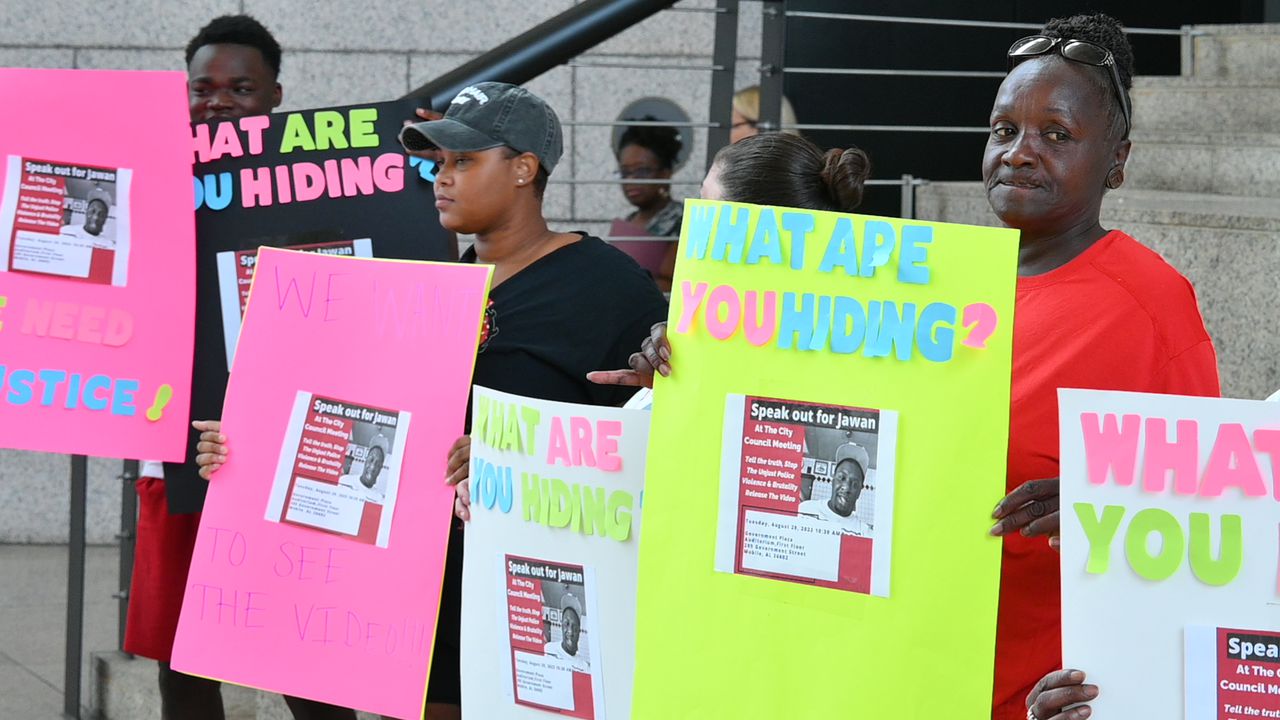Proposed Mobile body cam ordinance may allow third party to view footage
A tense Mobile City Council public safety committee meeting Tuesday afternoon cleared up some ambiguity surrounding a proposed ordinance concerning who can and can’t view police body cam footage.
The ordinance, sponsored by Council President C.J. Small and Mayor Sandy Stimpson, comes in the wake of months of back-and-forth conflict between city officials and the family and friends of Jawan Dallas, the 36-year-old man who died after being Tased by police on July 2. The family didn’t get to view the footage until last week, and their legal team claimed it showed “officers illegally accosting, assaulting and killing an unarmed innocent man while he begs for his life.”
According to council attorney Michael Linder, the ordinance would require the city to provide body cam footage to “stakeholders” unless “it’s contrary to another applicable law.”
“Stakeholders,” for the purpose of this ordinance are defined as, in short, someone who is the subject of the recording or a personal representative of the subject, according to Ala. Code § 36-21-212. The general public is not included in this definition of stakeholder.
“What the state law does is that it gives Alabama municipalities or police departments or law enforcement agencies the option — but it’s actually not mandatory for them — to disclose footage like this,” Linder said.
This ordinance would not allow the police to release body cam footage; rather, it mandates the body cam footage be disclosed to the stakeholders. Disclosure simply means viewing the footage, whereas release means a copy is provided for outside viewing.
“Under the current city code, it is illegal to disseminate this (footage) broadly to the public,” Linder said.
Laws that could prevent stakeholders from viewing the camera footage include, for example, in the case of Jawan Dallas, grand jury secrecy. Footage could also be held up by a police investigation. State law limits the actions the city can take with this ordinance, attorneys said throughout the meeting.
“That’s a Montgomery discussion, but once again, Mr. Linder has threaded the needle to make sure that we tighten this up,” Mobile City Attorney Ricardo Woods said. “It gives us a level of responsiveness to stakeholders.”
Requests made by council members include putting a time limit on how long from an incident a grand jury can subpoena the police footage, reviewing similar legislation from other cities and allowing a third party, such as an advocacy organization like the NAACP, to view the footage.
“There used to be a group that would look at evidence from the city ahead of time so they could have a bird’s eye view as to the extent of the evidence of what happened so that they could report back to the community,” council member William Carroll said to the committee. “I’ve had several people all wailing at me telling me that this was done in the past, and we’re not taking advantage of it anymore.”
Carroll said he believes the city needs to be responsible for becoming more transparent to the public. “It’s our responsibility to be as transparent as possible, and have as much right information out there as possible to protect the public trust,” Carroll said. “The more we fight against protecting the public trust, the bigger mess we make. The climate in the city is awful. It’s awful.”
Council member Joel Daves was quick to say he “objects” to Carroll, who he said “gets up high on his soapbox and starts holding himself above everybody.”
“We’re here because we want to be as transparent as we possibly can and protect the rights of everybody involved, including the public,” Daves said.
Mobile City Attorney Ricardo Woods said that he is glad the council is engaging with the language and intention of the ordinance.
“I think the council members have a very difficult job dealing with this ordinance because it is such a complex issue,” Woods told media after the meeting. “The fervent discussion about what we need to do going forward to alleviate some of the issues or perceived issues is really important, and I think the council is tackling that head-on.”
The council ended the meeting with the intention to have another committee meeting next Tuesday, Dec. 5, at noon to continue the discussion about the ordinance. Public comment is not allowed in committee meetings, but anyone is allowed to attend.
